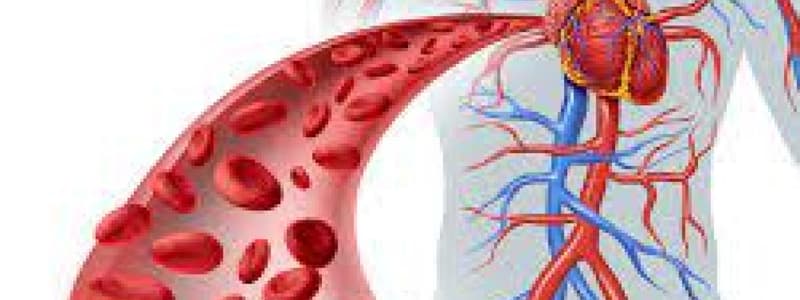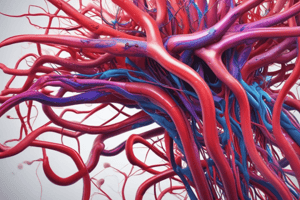Podcast
Questions and Answers
Which vessels have the greatest pulse and mean arterial pressure?
Which vessels have the greatest pulse and mean arterial pressure?
- Capillaries
- Venules
- Arteries (correct)
- Veins
What is resistance in the context of blood flow?
What is resistance in the context of blood flow?
- The resistance to flow of a fluid.
- The degree of friction that blood encounters as it travels through the blood arteries. (correct)
- The thickness of a liquid.
- The resistance of blood in blood arteries.
Which factors influence resistance in blood flow?
Which factors influence resistance in blood flow?
- Blood pressure, blood volume, and blood velocity.
- Blood volume, blood flow rate, and blood velocity.
- Blood flow rate, blood pressure, and blood viscosity.
- Blood viscosity, vessel length, and vessel radius. (correct)
How does blood flow change when the radius of an artery shrinks?
How does blood flow change when the radius of an artery shrinks?
What happens to total blood flow when resistance increases?
What happens to total blood flow when resistance increases?
What is the relationship between blood pressure gradient and total blood flow?
What is the relationship between blood pressure gradient and total blood flow?
Which enzyme converts angiotensin I to angiotensin II?
Which enzyme converts angiotensin I to angiotensin II?
What is the main action of aldosterone on blood pressure?
What is the main action of aldosterone on blood pressure?
What is the effect of ADH on blood pressure?
What is the effect of ADH on blood pressure?
What is the main action of angiotensin II on blood pressure?
What is the main action of angiotensin II on blood pressure?
What is the main action of atrial natriuretic peptide (ANP) on blood pressure?
What is the main action of atrial natriuretic peptide (ANP) on blood pressure?
During exercise, what happens to the distribution of blood flow in the body?
During exercise, what happens to the distribution of blood flow in the body?
Which of the following is the formula to calculate net filtration pressure (NFP) at the arterial end of a capillary?
Which of the following is the formula to calculate net filtration pressure (NFP) at the arterial end of a capillary?
What is the typical value for Colloid Osmotic Pressure (OPc) at the arterial end of a capillary?
What is the typical value for Colloid Osmotic Pressure (OPc) at the arterial end of a capillary?
What is the typical value for Hydrostatic Pressure (HPc) at the venous end of a capillary?
What is the typical value for Hydrostatic Pressure (HPc) at the venous end of a capillary?
What is the formula to calculate net filtration pressure (NFP) at the venous end of a capillary?
What is the formula to calculate net filtration pressure (NFP) at the venous end of a capillary?
What percentage of fluid that has flowed from the blood into the interstitial fluid is typically reabsorbed by the capillary at the venous end?
What percentage of fluid that has flowed from the blood into the interstitial fluid is typically reabsorbed by the capillary at the venous end?
What is the role of the lymphatic system at the capillary bed?
What is the role of the lymphatic system at the capillary bed?
Which process causes blood vessels, particularly arterioles and precapillary sphincters, to relax and expand in response to certain signals or stimuli?
Which process causes blood vessels, particularly arterioles and precapillary sphincters, to relax and expand in response to certain signals or stimuli?
What is vasoconstriction?
What is vasoconstriction?
What is metabolic vasodilation?
What is metabolic vasodilation?
What triggers a local inflammatory response?
What triggers a local inflammatory response?
What is the equation for mean arterial pressure (MAP)?
What is the equation for mean arterial pressure (MAP)?
What is considered an adequate mean arterial pressure (MAP) for perfusion?
What is considered an adequate mean arterial pressure (MAP) for perfusion?
According to the principle of continuity, which of the following statements is true about the relationship between total cross-sectional area and velocity of blood flow?
According to the principle of continuity, which of the following statements is true about the relationship between total cross-sectional area and velocity of blood flow?
What are the consequences of slow blood flow in the capillaries?
What are the consequences of slow blood flow in the capillaries?
Which statement accurately describes the process of diffusion in capillaries?
Which statement accurately describes the process of diffusion in capillaries?
Which statement accurately describes the process of vesicular transport in capillaries?
Which statement accurately describes the process of vesicular transport in capillaries?
What is the process of bulk flow in the context of blood circulation?
What is the process of bulk flow in the context of blood circulation?
How do hydrostatic pressure and colloid osmotic pressure work together in the capillaries?
How do hydrostatic pressure and colloid osmotic pressure work together in the capillaries?




